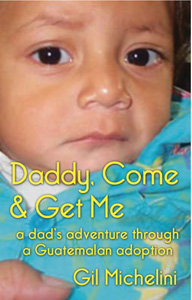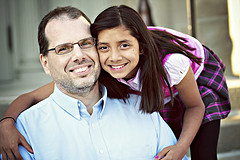As a first-time author, I know how difficult it can be to convince the world to notice a new book by an unknown writer. Thus, when my fellow adoptive parent and Facebook friend, Gil Michelini, asked me to read his personal account of adoption from Guatemala and post about it, I quickly agreed. Gil and his wife, Fran, were biological parents to three daughters when Gil felt his calling to adopt. The book Gil wrote about the experience, Daddy, Come & Get Me (Emiliani Publishing), traces the couple’s journey to become parents to the girl they named Gemma. Gil describes Daddy, Come & Get Me as “the first memoir of an American dad’s adventure following his calling to adopt a daughter from Guatemala.”
Daddy, Come & Get Me is available as a physical book ($14.95) as well as in the Kindle ($2.99) and Nook ($2.99) formats. For details, visit Gil’s website www.DaddyComeAndGetMe.com and select a vendor from the ones listed across the top of the page, or order through your local bookstore. Please note: Daddy, Come & Get Me contains strong religious themes.
Recently, I caught up with Gil to ask him a few questions about his story and the writing process.
What gave you the idea to write your book?
I knew when we brought Gemma home that this was a story that had to be told. The only problem was that the Gil I was at the time was not a person who could tell it through this medium. I had to be humbled and clear out a lot of my baggage I had been carrying around. Five and a half years after bringing Gemma home, I was finally the right person to start this project.
Holding Daddy, Come & Get Me is a thrill because I struggled with the basics of the American language while in school. Writing a book was a lifelong dream.
Did you learn anything about yourself in the process?
Aside from being able to touch people with my story and possibly help an orphan become an adopted child, self-discovery has been the greatest gift of writing this book.
There is another book, at least the size of the final version of Daddy, Come & Get Me, that ended up on the cutting-room floor. It is the stuff readers didn’t need to know, but I needed to get out and deal with. Most of the four years of writing and re-writing and re-writing and re-writing and re-writing was discovering who was I during that time. Why did I do the things I did? Why didn’t I do what I should have? Several time during the writing process I had to seek forgiveness from my children and my wife, Fran, for who I was then. My marriage is much stronger now because of the book, as is my relationship with my children.
As a writer, you chose to reveal the character of Gemma’s birth mother, Dolores, through episodes as you imagined them. What led you to that choice?
Originally, I wrote a chapter where I’m in the hotel room the night before we left Guatemala, recounting what we read in Gemma’s adoption documents. That’s what actually happened, but it was one boring chapter.
Later, I was at a writing class when someone was talking about bringing a character alive for her historical fiction book. The character was historical and the author had to develop a situation where she encountered her fictional characters. From this conversation, the idea for the chapters involving Dolores [Gemma’s birth mother] was born.
Those were the hardest chapters to write because this Anglo-White-American-Male had to write a story of what a Guatemalan woman might be thinking. Through Facebook, I found a Guatemalan woman who helped me with the details. The Holy Spirit did the rest because I could not have written those chapters on my own. Almost all of those chapters are based on official Guatemalan adoption documents. All the characters–except the ladies in the park–are real, but their names have been changed. I wrote these chapters to honor a woman I most likely never will meet, but who gave me one of the greatest gifts, my daughter.
Religious faith plays a large role in your story. Can you talk about that?
I hired a book coach to review the first fifty pages and give me an evaluation. One of the first things she told me was to dump all the religious references because I would narrow my market too much. I knew then that I should leave it all in.
Adopting Gemma was so far beyond anything I had ever accomplished on my own. It never would have been possible without Divine intervention. To have told this story without talking about its Author would not have been true to essence of the story.
Yes, the book coach was right. Including God has narrowed my market, but this is not a story for everyone.
Do you have any advice for people considering adoption? Are there things you would do the same? Differently?
Fully understand why you are planning to adopt. It is the hardest way to become a parent and prospective parents must be very clear in their goal, or else they may be tempted to give up. Do not adopt to save a child.
If I could have done the adoption over, I would have spent much more time ensuring Fran and I were in agreement about the process. There is a scene in the book when I consider that I might be selfish about the whole thing. The truth is, I was selfish and pushed Fran into this rather than walking together. Because Fran was a person who did not want to cause conflict, she went along to get along, and it was easy for me to be that person. When we came home, Fran struggled because of her anger with me.
How has adoption changed your family, if it has? Is the experience what you expected?
We look at the world much differently because we’ve seen more of it. When we hear about the suffering of Guatemala, our hearts hurt because they are family. I care much less about my European heritage than I did before because I do not want to exclude a family member. Because of our family’s experience, we are better able to understand the challenges of different ethnic and cultural heritages.
Any plans to write a follow-up?
Daddy Came & Got Me is Fran’s idea for a children’s book that tells Gemma’s story. We’re still batting around ideas. I’ll let you know when it’s completed. ~
Tags: adoption memoirs, books about Guatemalan adoption, Gil Michelini, Guatemalan adoption





 ShareThis
ShareThis